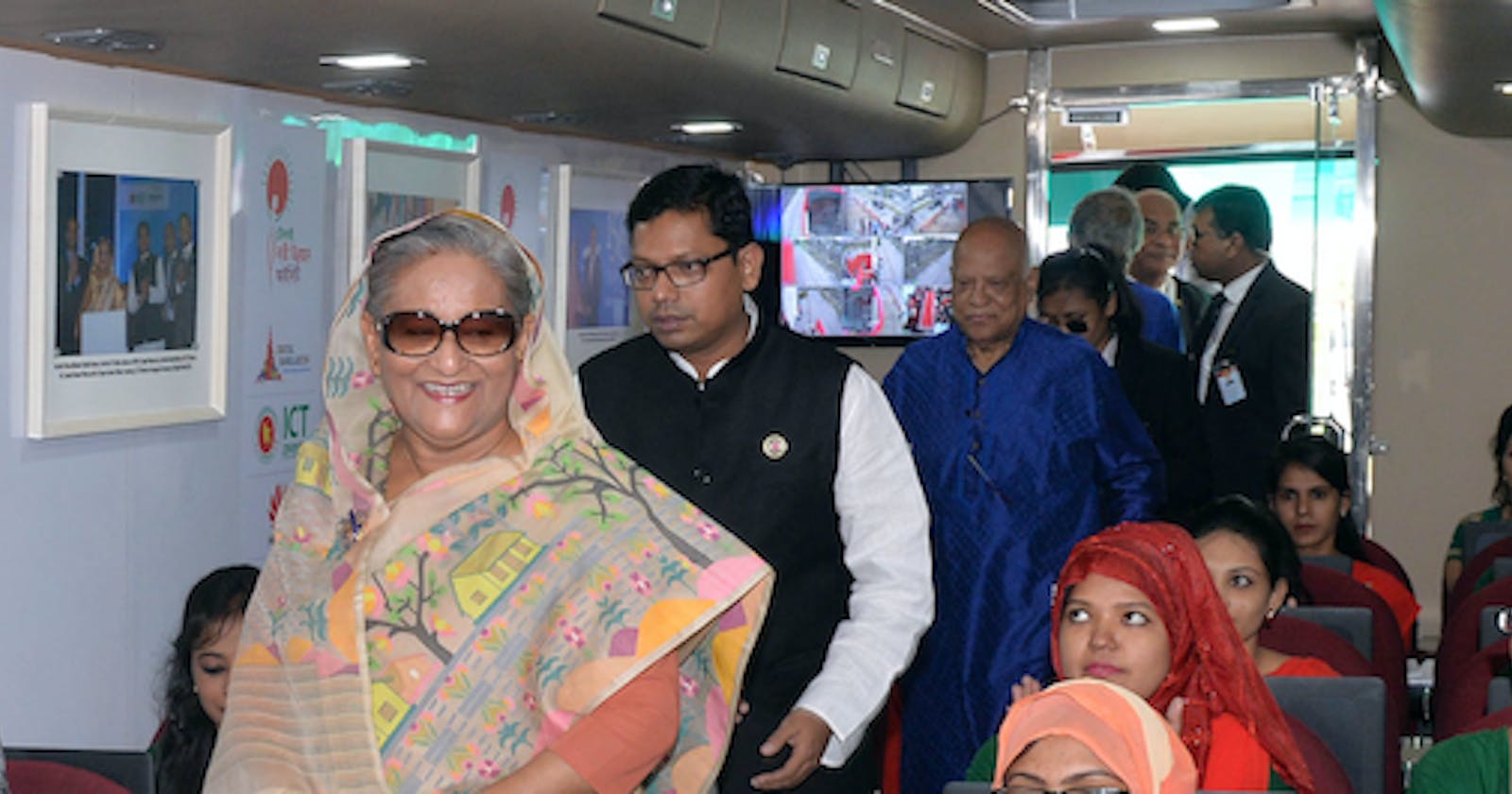Sustainable Development of the Women through ICT Training by Digital Training Buses of Learning and Earning Development Project of ICT Division
Table of contents
No headings in the article.
Information and Communications Technology (ICT) education has been identified as one of the key catalysts for women empowerment in the developing countries. In Bangladesh, women residing in the rural areas and having potentials to contribute significantly in the country’s development will be offered basic ICT training in their locality. So that they can take parting the socio-economic growth of this country. Bangladesh is a country with a mix of 51% population under the age of 25, where male and female ratio is almost equal. More than 70% of our population still resides in the rural areas, where even basic ITC trainings can hardly be provided. In a context like this- to attain the vision of a Digital Bangladesh-the rural women having Secondary School Certificates need to be facilitated with ICT trainings so that they can use their untapped potential and start contributing not only to their livelihood but also communities as a whole. Concept:
ICT Division of the Ministry of Post & Telecommunications (MoPT), is conducting the project activates to launch an ambitious reach for the development rural women across different parts of Bangladesh. Already six (06) buses, fully equipped with modern ICT training facilities, are successfully deployed to offer ICT training particularly designed for the women who cannot move from their native locality due to various socio-economic constraints. Robi Axiata and Huawei these two companies are actively helping to make this activity successful. This project is a first-of-its-kind initiative in Bangladesh to empower rural women through ICT in line with the Vision 2021, and will play a vital role to include young rural women in the journey towards “Digital Bangladesh”. In the long-run, this project aims to help build a strong network of talented women, who can contribute through ICT as much as men. Prime Minister Sheikh Hasina emphasizes on women empowerment and promotion of ICT at every sphere of life. We like to reinforce our commitment to achieve this by taking the necessary steps to attain the SDGs. It is expected that through the Mobile Training Buses more than 1.6 lac women will be trained within next 3 years at the outlying areas of the country. Through this we are prioritizing the promotion of women’s entrepreneurship enhancing the capabilities of women. It is believed that these steps would make them more productive, self-sufficient and their initiatives would be beneficial for social and economic development too. Finally, it is hoped that they will actively contribute to the development of the community and national economy. The project is expected to generate massive interest among the women, especially in rural areas, to pursue entrepreneurship through ICT. This project popularize the ICT education not only among women but also among other school and college students./ The buses are moving from Upazilla (Sub-Upazilla) to Upazilla (Sub-Upazilla) and dispensing IT and outsourcing basic education among the young rural educated woman including student of high school and colleges. The training is provided by the programmer of ICT Division under the control and guidance of the Deputy Commissioner and Upazilla Nirbahi Officers. Learning and Earning Development Project Authority is co-coordinating and supervising the total training. Training materials like pen, pad, modules, trainer, refreshment etc are facilitated free of cost.
Activity:
The Information Communication Technology Division started the training in a festive mood through the inauguration ceremony by Honorable Prime Minister, Sheikh Hasina on 12 December 2016. A modest design for the ICT training bus has developed providing full furnished training facilities to conduct comfortable training class within the bus keeping the spaces of chair, table, laptop, electricity, 3G data connectivity, light, air cooler, projector for power point presentation etc can roam all over the country including rural areas, where roads are not feasible for low height vehicles. Finally, they come up with a full fledge plan, where Buses can move one district to another and train basic ICT knowledge towards the students of different rural school, colleges. Developed the Wi-Fi facility, Information Communication Technology Division designed the training module for the aforesaid training. The special-purpose in the digital training buses is air-conditioned, soundproof, and equipped with 23 workstations per vehicle. Training facility infrastructure will include one laptop per trainee, large format LED screens, sound system, Wi-Fi, customized training modules, learning software, and stand-by generator. ICT ministry and Market Access providers Ltd. worked very closely to finalize the route plan six ICT training buses. Coordination between local administrative authorities to aware the local women, registration process. Finally facilitate the Information Communication Technology Division bus to their doorstep those needed most. Training materials are provided free of cost and the training modules and trainers will be facilitated and supervised by ICT Division. Each bus has individual route plan, and a bus will be operational 40 weeks a year. Each location will have one or two days of training depending on local participants’ number and requirements. These buses are maintained by Robi in collaboration with ICT Division. Once, the ICT training will be completed in a locality, the buses will be used for road show purpose to generate ICT related awareness among the young students of that locality. Learning and Earning Development Project, in the mean time, trained (15 days IT basic training) 20 thousand educated women in the Union level and professional outsourcing training (50 days) to 3250 women of which most of them are earning foreign currency through outsourcing. More 12 thousand educated women are going to be trained (Professional Outsourcing Training) within 2018 through LEDP. These trained women are gradually standing on their own foot socially and economically.
A 3-year preliminary project of 06 buses have a target of providing basic ICT training to 1,66,320 young and talented women covering 64 districts across Bangladesh. It is expected that this initiative will have multi-fold benefits in empowering rural women from distant areas.
Amplification:
Providing basic ICT training to rural educated women. Create a database of ICT trained rural youth having potential to contribute to their community through ICT (facilitating future leadership at local hubs). Generate employment and create enthusiasm around women entrepreneurship through ICT. Conduct road shows at rural areas to popularize ICT education not only among women but also among other school and college students. Create ICT compliance and safety awareness in those localities.
Result:
The Government of Bangladesh is moving ahead to its digitalization plan, will establish justice and ensuring delivery of government services to the citizens of Bangladesh through maximum use of technology, with the ultimate goal being the overall improvement of the daily lifestyle of general people. As part of Vision 2021: Digital Bangladesh, the Government of the People’s Republic of Bangladesh has approved a project titled “Learning and Earning Development Project” to be implemented by the ICT Division of the Ministry of Posts, Telecommunications and Information Technology. The specific achievements of the project are to:
Train 55,000 persons and developed them as skilled manpower to be freelancers in the IT/ICT sector. Expose outsourcing capabilities in IT/ICT era into global market leading. Created new job facilities in the global market and improve national awareness at all levels. Create master trainers in freelancing area to disseminate the training program in the grassroots level.
Project Personnel: Project Director: Humayun Kobir Deputy Project Director: Md Anwar Hossain IT Consultant: Engr. Rajib Mazumder

